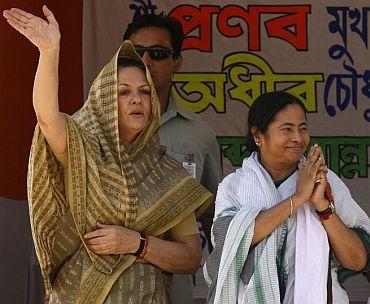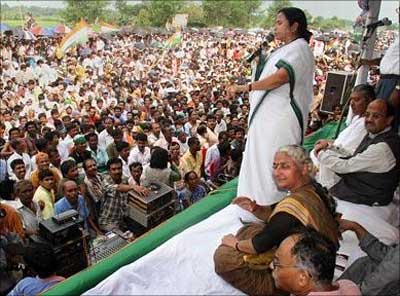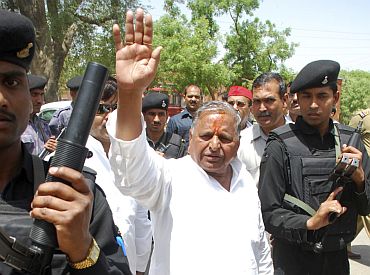 | « Back to article | Print this article |
Beginning of the end of Congress-Mamata love-hate relationship
Mamata Banerjee's opposition to the Congress's Lokpal Bill was not a stand-alone event. Her unrelenting stand on FDI and other reform measures of the government are signs of a failing relationship, says Neerja Chowdhury.
After the fracas in the Rajya Sabha over the Lokpal Bill on Thursday night, the countdown to parting of the ways between the Congress Party and the Trinamool Congress has begun.
The directive of Trinamool Chief Mamata Banerjee to her party MPs in the upper house to force a vote on the party's amendments -- that all references to the Lokayukta should be deleted -- obviously took the ruling Congress by surprise, and angered many.
The stand of the Trinamool Congress obviously did not just stem from their reservations about a central bill providing for the creation of Lokayuktas in states, and their concern for preserving the federal spirit. The Trinamool MPs remained unyielding all through the day despite many meetings with Finance Minister Pranab Mukherjee to convince them. From all accounts the government was willing to consider "a way out" by which the Lokayukta legislations provided for in the bill could become just an "enabling" measure for the states.
Had concern for the federal principle been the real reason for their opposition, Trinamool MPs would not have voted for the same provisions in the Lok Sabha only a day earlier. They would also not have supported the bill in the Union Cabinet.
The timing of the Trinamool's opposition in the Rajya Sabha, where the Congress was vulnerable on numbers, proved to be the turning point -- and a move that changed the game. Only a day earlier the government had agreed to an amendment in the bill that was passed by the Lok Sabha, providing for the consent of the states.
Click NEXT to read further...
Mamata wants a mid-term poll, Congress leaders suspect
Mamata's frontal opposition to the Lokpal and Lokayukta Bill, 2011, is not a stand-alone event. It came after the will-not-budge stand on Foreign Direct Investment in retail, which had hugely embarrassed the government and compelled it to put the decision -- which had international ramifications -- in abeyance.
Banerjee had decided at the last minute not to accompany the prime minister to Bangladesh because of her opposition to the bilateral agreement on sharing of the Teesta waters, which led to the abandonment of the agreement.
Banerjee also continues with her opposition to reform measures proposed by the government, like the bill on pension fund. On Thursday, she also wanted to demonstrate that her party props the government and she calls the shots in the United Progressive Alliance. In this instance, she may have also wanted to set the agenda for the regional parties, all of whom, particularly the Left, had expressed reservations about federalism.
Banerjee's strategy appears not just to "out-Left" the Left, but also to create an environment of instability, in the hope of bringing on a midterm poll, Congress leaders suspect.
The sooner a general election takes place, the better it would be for her. For, extrapolating from the results of the recent West Bengal assembly polls, she is expected to fare very well. But with every passing month things are going to get difficult for her; governing West Bengal being a humongous challenge.
Click NEXT to read further...
'Mamata has used every opportunity to embarrass the Congress'
Mamata Banerjee has started the process of distancing herself from the Congress. She has clearly used every opportunity that comes her way to make it as embarrassing for the Congress party as she can.
As for the Congress, there is anger building up in its ranks. The state leaders of the party are already expressing their unhappiness in no uncertain terms. However, the central leaders are still circumspect.
The Congress is waiting for the polls in Uttar Pradesh, which is being billed as the mother of all elections. If the party increases its tally in the state and can form a government with the Samajwadi Party and the Rashtriya Lok Dal, which could be a likely scenario, then it can tie up with Mulayam Singh Yadav's party at the Centre.
Yadav can then enter the Union government and not just be an outside supporter. This will help the Congress offset the loss of Mamata Banerjee's 19 Lok Sabha MPs, if push came to shove. It would help make the Congress's position a little more comfortable and also help rein in Mamata, if she realises that the Congress is not entirely dependent on her.
The unfortunate events of Thursday, with the Congress having egg on its face for its mishandling of the situation in the Rajya Sabha, could also be the first step towards new political alignments.
Click on next to read more...



